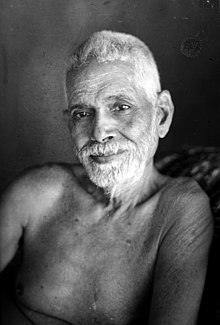
Back Ramana Maharshi ALS رامانا العظيم Arabic Ramana Maharshi AST Рамана Махарши Bashkir রমণ মহর্ষি Bengali/Bangla Ramana Maharshi Catalan Ramana Maharši Czech Ramana Maharshi Danish Ramana Maharshi German Ramana Maharŝi Esperanto
Ramana Maharshi | |
|---|---|
 Ramana Maharshi in his late 60s | |
| Personal | |
| Born | Venkataraman Iyer 30 December 1879 |
| Died | 14 April 1950 (aged 70) |
| Religion | Hinduism |
| Nationality | Indian |
| Organization | |
| Philosophy | Self-enquiry (Jnana Yoga) |
| Religious career | |
| Guru | Arunachala |
| Literary works | Nān Yār? ("Who am I?") Five Hymns to Arunachala |
Of all the thoughts that rise in the mind, the thought 'I' is the first thought.
| Part of a series on |
| Advaita |
|---|
 |
|
|
| Part of a series on |
| Hinduism |
|---|
 |
Ramana Maharshi (Sanskrit pronunciation: [ˈɾɐ.mɐ.ɳɐ mɐˈɦɐɾ.ʂi]; 30 December 1879 – 14 April 1950) was an Indian Hindu sage[1] and jivanmukta (liberated being).[2] He was born Venkataraman Iyer, but is mostly known by the name Bhagavan Sri Ramana Maharshi.[3][note 1]
He was born in Tiruchuli, Tamil Nadu, India in 1879. In 1895, an attraction to the sacred hill Arunachala and the 63 Nayanmars was aroused in him,[4] and in 1896, at the age of 16, he had a "death-experience" where he became aware of a "current" or "force" (avesam) which he recognized as his true "I" or "self",[web 1][5] and which he later identified with "the personal God, or Iswara",[web 1][note 2] that is, Shiva. This resulted in a state that he later described as "the state of mind of Iswara or the jnani".[web 1][note 3] Six weeks later he left his uncle's home in Madurai, and journeyed to the holy mountain Arunachala, in Tiruvannamalai, where he took on the role of a sannyasin (though not formally initiated), and remained for the rest of his life.
He attracted devotees that regarded him as an avatar of Shiva and came to him for darshan ("the sight of God"). In later years, an ashram grew up around him, where visitors received upadesa ("spiritual instruction")[7] by sitting silently in his company or by asking questions.[8] Since the 1930s his teachings have been popularized in the West.[9]
Ramana Maharshi approved a number of paths and practices,[3] but recommended self-enquiry as the principal means to remove ignorance and abide in self-awareness,[web 2][10] together with bhakti (devotion) or surrender to the Self.[web 2]
- ^ Sharma 2006.
- ^ Fort 1998, p. 134–151.
- ^ a b Godman 1985.
- ^ Osborne 2002, p. 5–6.
- ^ Godman 1985, p. 4.
- ^ Zimmer 1948, p. 23.
- ^ Osborne 1959.
- ^ Godman 1985, p. 5.
- ^ Lucas 2011.
- ^ Zimmer 1948.
Cite error: There are <ref group=note> tags on this page, but the references will not show without a {{reflist|group=note}} template (see the help page).
Cite error: There are <ref group=web> tags on this page, but the references will not show without a {{reflist|group=web}} template (see the help page).
© MMXXIII Rich X Search. We shall prevail. All rights reserved. Rich X Search